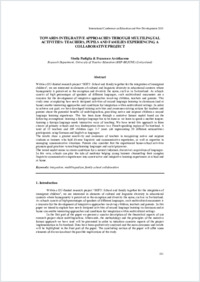Towards integrative approaches through multilingual activities : Teachers, pupils and families experiencing a collaborative project
Haute École Pédagogique BEJUNE
- Padiglia, Sheila ORCID Haute École Pédagogique BEJUNE
- Arcidiacono, Francesco ORCID Haute École Pédagogique BEJUNE
- 2015
Published in:
- International Conference on Education and New Developments. Proceedings / Carmo, Mafalda. - 2015, p. 251-255
English
Within a EU-Within a EU-funded project “SOFT: School and family together for the integration of immigrant children”, we are interested in elements of cultural and linguistic diversity in educational contexts where homogeneity is perceived as the exception and diversity the norm, such as in Switzerland. As schools consist of high percentages of speakers of different languages, such multicultural encounters are a resource for the development of integrative approaches involving children, teachers and parents. This study aims at exploring how newly designed activities of second language learning in classroom (and at home) enable interesting approaches and conditions for integration within multicultural settings. In order to achieve our goal, we have developed training activities and awareness-raising actions for teachers and parents about the potential benefits of multilingualism, providing native and migrant children a second language learning experience. This has been done through a narrative format model based on the following assumptions: learning a foreign language has to be done as we learn to speak a mother tongue; learning a foreign language needs interactive ways of teaching. We have tested this approach in three classes of primary schools and two kindergarten classes in a French-speaking region of Switzerland. A total of 15 teachers and 169 children (age: 3-7 years old representing 20 different nationalities) participated, using German and English as languages.
The results show a greater sensitivity and awareness of teachers in recognizing native and migrant students as learners who hold diverse linguistic and communicative repertoires, as well as expertise in managing communicative situations. Parents also consider that the experienced home-school activities promote good practices in teaching/learning languages and social processes.
The tested model seems to create conditions for a natural (informal, discursive) acquisition of languages. In this vein, schools can play the role of mediator helping young learners channelling their complex linguistic-communicative experiences into constructive and integrative learning experiences at school and at home.
The results show a greater sensitivity and awareness of teachers in recognizing native and migrant students as learners who hold diverse linguistic and communicative repertoires, as well as expertise in managing communicative situations. Parents also consider that the experienced home-school activities promote good practices in teaching/learning languages and social processes.
The tested model seems to create conditions for a natural (informal, discursive) acquisition of languages. In this vein, schools can play the role of mediator helping young learners channelling their complex linguistic-communicative experiences into constructive and integrative learning experiences at school and at home.
- Language
-
- English
- License
- CC BY
- Open access status
- gold
- Identifiers
-
- ISBN 9789899938922
- Persistent URL
- https://sonar.ch/global/documents/312260
Statistics
Document views: 52
File downloads:
- END2015_Book-of-Proceedings.pdf: 109
